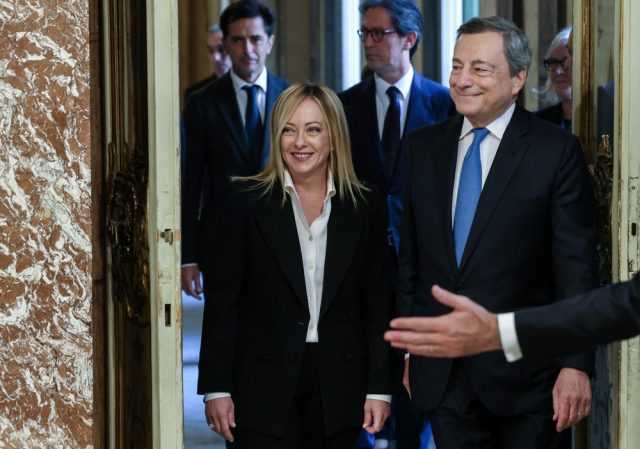
The Communion and Liberation 2025 meeting offered a privileged arena for exchanging differing visions of Europe’s future. The speeches given by Mario Draghi and Giorgia Meloni demonstrated convergence in acknowledging the European Union’s critical role, but significant differences in the proposed solutions and underlying political perspectives. Among the numerous speeches that characterized this edition, two attracted particular attention: the one by Mario Draghi, former President of the European Central Bank and former Italian Prime Minister, and the one by Giorgia Meloni, current Prime Minister. Both addressed the future of the European Union, identifying its geopolitical marginality as the central issue to be addressed. However, the solutions proposed and the political vocabulary adopted were at different levels, reflecting their respective institutional experiences and visions.
MARIO DRAGHI: FROM EUROPEAN ILLUSION TO COMMUNITY PRAGMATISM
Mario Draghi’s speech was notable for its critical tone regarding the European Union’s foreign and trade policy. According to the former prime minister, Europe had deluded itself into believing that its economy could automatically translate into geopolitical power. This belief, Draghi emphasized, has proven unfounded, as demonstrated by the EU’s difficulty asserting itself in trade relations with the United States and its lack of an active role in Middle Eastern conflicts. Draghi accused the Union of becoming a “spectator,” incapable of reacting to crucial events. This passivity, he argued, risks relegating the continent to a marginal position on the international stage, at a time when geopolitical balances are being redefined by the rise of China and the reorganization of transatlantic relations. The core of the proposal aims to move beyond the rhetoric of integration by looking at concrete instruments of cooperation. In this sense, Draghi raised the idea of introducing forms of common European debt, along the lines of Next Generation EU, to finance large-scale projects that individual states could not sustain.
GIORGIA MELONI: CONSERVATIVE PRAGMATISM AND THE CENTRALITY OF WESTERN IDENTITY
The closing remarks of the meeting were delivered by Giorgia Meloni, who reiterated some of Draghi’s criticisms of the European Union, reworking them from a political and identity perspective. Meloni affirmed the need for a “Europe of pragmatism.” According to the Prime Minister, the real challenge is to build a Europe capable of “doing less and better,” recalling the Union’s motto — “United in diversity” — as a guiding principle. In this sense, while acknowledging the EU’s geopolitical irrelevance, Meloni opposed solutions that imply greater fiscal or financial integration, preferring instead a selective reduction of community competences in favour of national ones. The Prime Minister acknowledged sharing some of Draghi’s criticisms. However, while he sees debt sharing and more effective common policies as a way forward for Europe, Meloni proposes a conservative vision, in which member states remain the key players.
CONVERGENCES AND DIVERGENCES
A comparison of Draghi and Meloni’s speeches reveals both points of convergence and significant divergences. Both speakers shared the observation of the European Union’s geopolitical irrelevance. From this perspective, both Draghi and Meloni called for a return to pragmatism, rejecting both the slogans and abstract rhetoric that traditionally accompany the debate on European integration. Furthermore, their analyses highlighted a shared awareness of the challenges posed by global competition with the United States and China, considered key powers for the future international balance. Alongside these convergences, however, equally significant divergences emerge. Draghi interprets pragmatism as the need to strengthen common policies, prioritizing the adoption of shared financial instruments, such as joint debt, and the implementation of far-reaching projects that would be impossible to implement through national efforts alone. Meloni, on the other hand, associates pragmatism with a reduction and selection of the powers attributed to the Union, in the belief that only a more essential Europe, respectful of national identities, can be effective. In this sense, while Draghi proposes a vision of Europe as an autonomous political actor, capable of transcending the role of a passive spectator, Meloni conceives it primarily as a community of sovereign states, united by their belonging to the Western world but not bound to further integration.
TWO VISIONS OF THE FUTURE OF THE UNION
The speeches by Mario Draghi and Giorgia Meloni at the Rimini Meeting represent two different approaches to the same diagnosis: Europe risks irrelevance. Draghi proposes responding by strengthening common instruments, focusing on shared debt and major transnational projects. Meloni, while sharing the criticism, instead advocates a pragmatism that prioritizes nation states, with particular attention to issues of identity and immigration. The discussion, far from being merely technical, reflects two visions of the Union’s future: that of Europe as a collective political actor and that of Europe as a community of sovereign nations.



 Subscribe
Subscribe